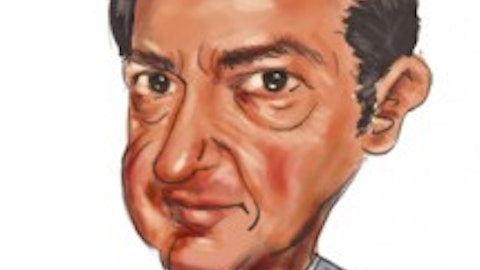According to a filing with the SEC, a Senior Vice President at Health Management Associates, Inc. (NYSE:HMA) bought 10,000 shares of the company’s stock on December 10th at an average price of $7.76 per share. Health Management Associates is an operator of hospitals, with a concentration in the southern U.S., and has a market capitalization of $2.1 billion. We like to track insider purchases because we would think that an insider would only buy the stock- and abandon the benefits of diversification- if they were very confident in the company. We’re also aware that insider purchases, at least on average, are bullish signals (see our discussion of studies on insider trading).
The company’s revenue in the third quarter of the year grew 18% from a year earlier after making allowances for doubtful accounts in both cases (before allowances, sales were up roughly the same amount). Costs trended even with revenue, however, leaving both operating income and net income about flat. This was an improvement on the first half of 2012, when earnings had fallen despite higher revenue. At its current valuation, Health Management Associates, Inc. trades at 14 times trailing earnings. That’s actually a bit high for the hospital industry, as investors are uncertain how the implementation of President Obama’s healthcare policy- particularly in different states- will affect various industries in the healthcare sector. However, despite the fact that earnings haven’t been particularly good so far this year, analysts expect growth on the bottom line in the next several years as the forward P/E is 9 and the five-year PEG ratio is 0.9.
Glenview Capital increased its stake in Health Management Associates, Inc. by 47% in the third quarter of the year, giving it a total of nearly 26 million shares in its portfolio (check out more of Glenview’s stock picks). Glenview is managed by Larry Robbins, who had previously worked at billionaire Leon Cooperman’s Omega Advisors. D.E. Shaw, a large hedge fund managed by David Shaw, also bought the stock and owned 1.7 million shares at the end of September though this position was only worth about $14 million at that time (see D.E. Shaw’s favorite stocks).
The largest-cap publicly traded hospital stock is HCA Holdings Inc (NYSE:HCA). HCA was one of billionaire John Paulson’s value picks during the third quarter (find more of Paulson’s favorite value stocks and see his full 13F portfolio), though given how poorly Paulson has been doing lately that might not be the best endorsement. Glenview is invested in HCA as well. HCA trades at 9 times forward earnings estimates, and reported revenue growth of 11% last quarter compared to the third quarter of 2011.
We can also compare Health Management Associates to Universal Health Services, Inc. (NYSE:UHS), Tenet Healthcare Corporation (NYSE:THC), and LifePoint Hospitals, Inc. (NASDAQ:LPNT). These stocks generally carry P/E multiples in the 10-11 range, placing them at a discount to where Health Management Associates is trading at least in terms of historical performance. Universal Health Services and Lifepoint each reported a double-digit percentage decline in earnings in their most recent quarter compared to the same period in the previous year; Tenet has had an out-of-the-ordinary increase in net income but its stock price has also risen to place it at about the same forward multiple as its peers. We’d note that while Lifepoint is more or less a standard hospital company, Tenet also operates a number of diagnostic imaging centers while Universal Health Services includes a business segment focused on behavioral health. Unless either of those businesses is exceptionally attractive, we think that we’d recommend HCA as it is the market leader and it is priced at a discount in terms of forward earnings.
The insider buy at Health Management Associates is interesting, and the stock does look like it may be on the cheaper side, but the business hasn’t been doing too well recently. In addition, there are other companies in the same industry which are better values in terms of their trailing earnings and their stocks might make better picks.




